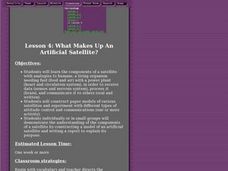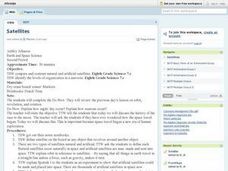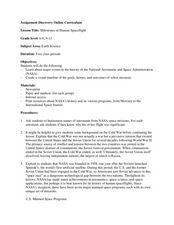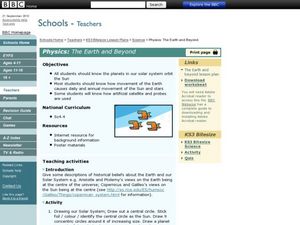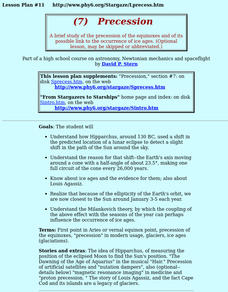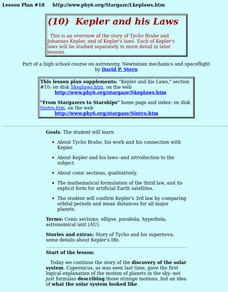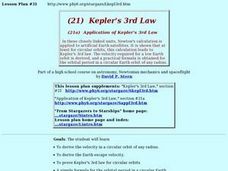Curated OER
What Makes Up An Artificial Satellite?
Students discover the components of a satellite using analogies to humans in a class discussion and participate in an activity in which they construct a paper model of a satellites and experiment with different types of attitude control...
Curated OER
Orbit an Artificial Satellite
Students construct an artificial satellite from random materials. They demonstrate the principle of an orbit. Students are divided into small groups. Each group creates a model of an artificial satellite in orbit.
Curated OER
Reading Satellite Images
Learners analyze satellite images. In this astronomy lesson, students examine 3 satellite images in order to understand how satellite images are taken and what they can teach scientists.
Curated OER
Satellites
Eighth graders explore the history of space travel and satellites. Through a teacher demonstration, 8th graders observe how a satellite revolves another object. They identify natural and artificial satellites, explore how satellites...
Curated OER
Comparing the Satellite and Broadcast Radio Landscapes
Students research the development of satellite technology over the last 50 years students explain how the enactment of the Telecommunications Act of 1996 changed the rules for corporate ownership of multiple media outlets.
Curated OER
How Does a Satellite Stay in Orbit?
Students explore placing a satellite into orbit, then about forces needed to keep an object in orbit. They examine how satellites orbit in elliptical paths and about properties of ellipses. They learn Kepler's 3rd Law of Planetary Motion
Curated OER
Sputnik
Students study Sputnik and what it looks like. In this Sputnik instructional activity students complete several activities while in groups.
Curated OER
Cherishing the Water of Life
Learners work in small groups to brainstorm a list of all creatures, plants, natural, and artificial processes that use or depend on fresh water. The class views an aquarium filled with water representing all the water in the world. The...
Curated OER
BOUNCING INFORMATION AROUND
Students examine how satellite signals are sent and duplicate it with a mirror, flashlight and black paper.
Curated OER
Solar System Hall Model
Not novel, but fun, this lesson gets your space science learners to model the size of the planets and the solar system along your school's hallway. Scaled measurements as well as actual distances are provided for both planet diameters...
Curated OER
Now That's Beautiful!
Your class experiences dozens of messages about beauty every day by reading magazines, watching movies, and listening to the radio. Have them analyze society's view of beauty in groups after discussing several resources, including...
Alabama Learning Exchange
Planetary Cereal Project
Sixth graders decorate an empty cereal box with information and games showing their comprehension of factual information about an assigned planet. This is a nice, creative lesson about the solar system.
Curated OER
Milestones in the Space Program
Students brainstorm names of astronauts from NASA space missions. They are explained that the Cold War was not actually a war but pervasive tension that existed between the United States and the Soviet Union for several decades...
Curated OER
Milestones in Human Spaceflight
Young scholars investigate the history and goals of NASA and human spaceflight. In this space science lesson plan, students answer questions about one of seven manned space programs and print pictures from the...
Curated OER
Physics The Earth and Beyond
Fourth graders will explore our solar system. In this physics lesson students create a model of the solar system to explore the movement of Earth, the Sun, and stars.
Curated OER
Life as a Legend: Marilyn Monroe: What is Beautiful?
Students consider the notion of beauty and what impact the media and popular culture have on it. In this cross curricular lesson, students examine print ads, write down and share their thoughts on them. Then students form literary groups...
Curated OER
Find Yourself with Global Positioning
Students examine different types of new mapping technologies. They use the internet to gather information about mapping and navigation. They create their own global positioning tool and defend it to the class.
Curated OER
Precession
Students explain how Hipparchus, around 130 BC, used a shift in the predicted location of a lunar eclipse to detect a slight shift in the path of the Sun around the sky. They examine the elliptical orbit in which the Earth travels around...
Curated OER
Kepler And His Laws
Pupils engage in an overview of the story of Tycho Brahe and Johannes Kepler, and of Kepler's laws. Each of Kepler's laws be studied separately in more detail in later lessons. They examine Kepler's 3rd law.
Curated OER
Quiz: Weather Prediction
In this science worksheet, 3rd graders will focus on the weather. Students will respond to ten fill in the blank questions regarding weather prediction.
Curated OER
Kepler and his Laws
Pupils examine Kepler's Laws. They confirm Kepler's 3rd law by comparing orbital periods and mean distances for all major planets and study conic sections, qualitatively.
Curated OER
Kepler's 3rd Law
Learners derive the velocity in a circular orbit of any radius. They derive the Earth escape velocity and prove Kepler's 3rd law for circular orbits # A simple formula for the orbital period in a circular Earth orbit of given radius.
Curated OER
Kepler's Third Law
High schoolers use Kepler's third law to derive the velocity in a circular orbit of any radius, and identify the Earth escape velocity.
